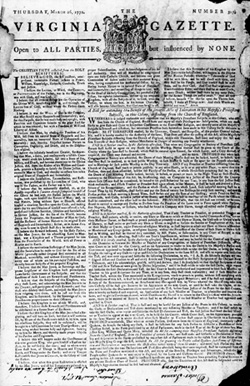A Clash Between Freedom and Religion in Virginia

In early 1772, during a lull in transatlantic tensions that followed the repeal of the Townshend duties, the relationship between growing numbers of dissenting congregations and the colonial government became a matter of political debate in Williamsburg. In August 1771, ten Baptist ministers were imprisoned in both Middlesex and Caroline counties for preaching outside to crowds, replacing, in the words of one critic, "orderly, pure, and rational worship" with "noise and confusion." When the Virginia assembly met in February, it was peppered with petitions from Baptists in five counties asking that the more explicit protection of worship provided by the Toleration Act of 1689 for other dissenters, such as Quakers and Presbyterians, be explicitly extended to them "as loyal and quiet Subjects."
The House of Burgesses referred the petitions to its standing Committee for Religion, which was responsible for "all Matters and Things relating to Religion and Morality." After considering the petitions for several weeks, the committee drafted "A Bill for extending the Benefit of the several Acts of Toleration to his Majesty's Protestant Subjects in this Colony, dissenting from the church of England." The bill was reported out of the committee on March 17, 1772, ordered to be printed, and scheduled to be considered further at the next session of the House, set for June 1772.
The bill was printed in full on the front page of William Rind's Virginia Gazette on March 26, 1772. The Baptists were not especially pleased with its terms, despite the bill's clear opening declaration, "That from and after the passing of this Act, all his Majesty's Protestant Subjects dissenting from the Church of England, within this Dominion, shall have an enjoy the full and free Exercise of their Religion, without Molestation or Danger of incurring any Penalty whatsoever." The burgesses did place a number of restrictions on that exercise, however. For instance, they could meet only in unlocked meeting houses during the day time, and groups of more than ten unrelated persons could not meet at all.
The burgesses were also very careful to make sure that dissenters could not take advantage of the bill's provisions to stir up trouble with slaves. It could not be used to permit free people to associate with slaves, "though assembled under Pretence of religious Worship." In what must have been for many readers the most paranoiac of the provisions, the burgess would make it illegal for any preacher, in public or in private, to teach "the Unfitness or Unlawfulness of Slavery" or baptize a slave without the written permission of owners, among other restrictive terms.
Postponed a number of times by the governor, the assembly did not meet again in a regular session for almost two years; consequently, no further action was taken on the bill until May 12, 1774, when a Baptist petition opposing it was submitted to the House of Burgesses. As far as the petitioners were concerned, the most objectionable provision of the bill was the requirement that they meet in the day time as "inconsistent with the law of England, as well as the Practice and Usage of the Primitive Churches, and even of the English Church." It was also inconvenient to dissenters whose day hours were usually spent at work. Another petition, by a group of Baptist ministers asking for the "liberty to preach in all proper places, and at all Seasons, without restraint," was referred to the Committee for Religion on May 16. The bill was not taken up again before the governor dissolved the assembly two weeks later for ordering the observance of "a day of Fasting, Humiliation, and Prayer" in protest of the closure of the port of Boston by the first of the Coercive Acts.
The Baptists tried again with a similar petition on June 13, 1775, during the last full session of the House of Burgesses, but with royal government in the midst of collapse, the bill was given no further consideration. Almost exactly one year later, however, the Fifth Virginia Convention passed the Declaration of Rights, the 16th article of which established that "all men are equally entitled to the free exercise of religion, according to the dictates of conscience."




